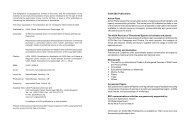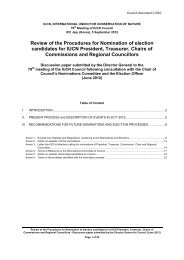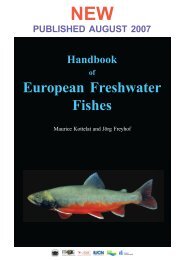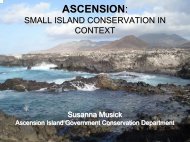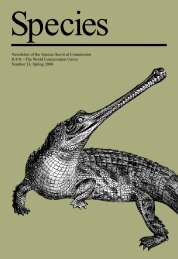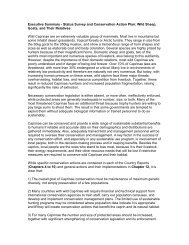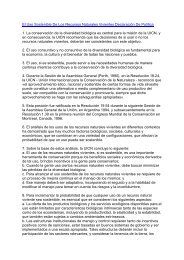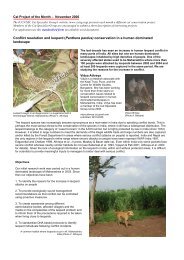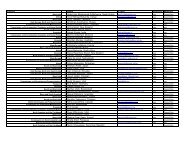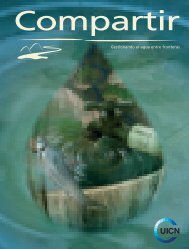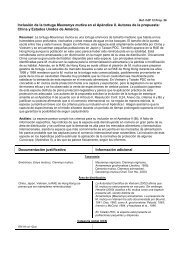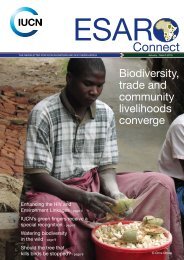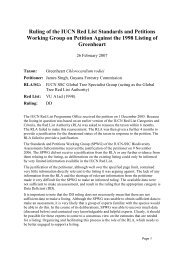Planning education to care for the earth - IUCN Knowledge Network
Planning education to care for the earth - IUCN Knowledge Network
Planning education to care for the earth - IUCN Knowledge Network
Create successful ePaper yourself
Turn your PDF publications into a flip-book with our unique Google optimized e-Paper software.
<strong>Planning</strong> <strong>education</strong> <strong>to</strong> <strong>care</strong> <strong>for</strong> <strong>the</strong> ear<strong>the</strong>xtension services <strong>to</strong> achieve its goal “<strong>to</strong> provide <strong>for</strong> <strong>the</strong> protection, wise use,understanding and enjoyment of <strong>the</strong> Great Barrier Reef in perpetuity through<strong>the</strong> <strong>care</strong> and development of <strong>the</strong> Great Barrier Marine Park”. GBRMPA isrecognized internationally as a leader in community <strong>education</strong> and extensionand in public participation programmes <strong>for</strong> <strong>the</strong> management of marine areas.Regular, direct, in<strong>for</strong>mal contact by GBRMPA staff with Reef user groups at<strong>the</strong> local, regional and State levels is strongly emphasized. Several advisoryand consultative committees have been established <strong>to</strong> represent political,economic and cultural interests in <strong>the</strong> development of <strong>the</strong> Marine Park. TheGreat Barrier Reef Consultative Committee provides an example of <strong>the</strong>cooperative arrangements needed <strong>to</strong> manage and evaluate activities in <strong>the</strong>Reef region. This independent committee advises <strong>the</strong> Federal Ministerresponsible <strong>for</strong> <strong>the</strong> Marine Park about developments in <strong>the</strong> Reef WorldHeritage Area. Nominated representatives of scientific, <strong>to</strong>urism, commercialand recreational fishing, government, and aboriginal groups sit on <strong>the</strong>committee which also develops communication among <strong>the</strong> major interestgroups.Regional Marine Park advisory groups have been established along <strong>the</strong>Queensland coast <strong>to</strong> stimulate communication among government agencies,NGOs and interest groups about a range of issues including water quality,<strong>the</strong> effects of fishing, coastal development and local management plans. Theadvisory groups stimulate public debate and provide a meeting ground <strong>for</strong>conflicting interests as, <strong>for</strong> example, between commercial fishermen andconservationists. One regional committee recently initiated a 3-4 yearclosure of a reef <strong>to</strong> replenish fish s<strong>to</strong>cks.As more local groups become involved in management, <strong>the</strong>re is less need <strong>for</strong>government regulation, expenditure and en<strong>for</strong>cement. Cooperation withvoluntary conservation organizations is important. The most influentialbodies - <strong>the</strong> Australian Conservation Foundation (ACF), <strong>the</strong> AustralianWilderness Society, <strong>the</strong> World Wildlife Fund (WWF) and GreenpeaceAustralia - have played a major role in raising <strong>the</strong> level of awareness andaction over marine and coastal issues. Since <strong>the</strong> 1970s a number of smaller,single-issue groups have emerged. They also facilitate <strong>the</strong> involvement of <strong>the</strong>Australian community in conservation issues and lobby governments.Natural resource agencies can make good use of <strong>the</strong> networks and <strong>the</strong> energyand commitment of <strong>the</strong>se groups, which produce magazines, newsletters,books, videos and brochures <strong>for</strong> <strong>education</strong>al purposes.Mutually beneficial relations with <strong>to</strong>urist organizations and commercial“extractive” users are vital. Cooperation with <strong>the</strong>se groups is needed ifregulations, management plans and <strong>education</strong> programmes are <strong>to</strong> achieve<strong>the</strong>ir objectives.Public participationThe Marine Park is managed primarily through <strong>the</strong> community’sunderstanding and acceptance of zoning and o<strong>the</strong>r management136



